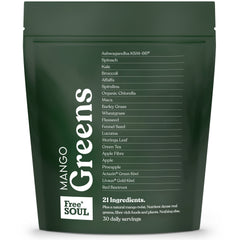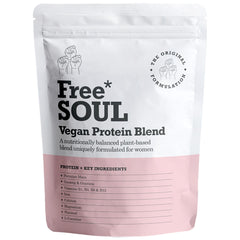A Nutritional Therapist's Guide to Managing Menstrual Pain

From cramps and nausea, to bloating and fatigue, our bodies really put us through it during our menstrual cycles. With many women experiencing cramping at some point in their 28 day cycle, we asked Nutritional Therapist, Marilia Chamon to share her tips for managing menstrual pain, and the lifestyle and diet changes you could make to relieve pain.
Menstrual pain, also known as dysmenorrhea, is a common concern for many women. It can range from mild discomfort to severe cramping and may be accompanied by other unwanted symptoms. While some level of discomfort can be normal, excessive pain can impact your daily life. As a Nutritional Therapist and gut health expert, I'm here to provide you with insights into how nutrition, lifestyle choices, and holistic approaches can make a significant difference in alleviating discomfort during your menstrual cycle.
Why Women Experience Menstrual Pain
It's essential to understand why women experience menstrual pain, as this knowledge can help you address it more effectively:
- Uterine Contractions: During menstruation, the uterus contracts to help shed its lining. These contractions can cause pain when they are strong and frequent.
- Hormonal Changes: Fluctuations in hormone levels, particularly prostaglandins, can contribute to increased uterine contractions and inflammation, leading to pain.
- Other Factors: Stress, underlying medical conditions like endometriosis or fibroids, and lifestyle factors can also influence the severity of menstrual pain.
Nutrition's Role in Managing Menstrual Pain
Nutrition plays a crucial role in managing menstrual pain. Here's how you can make dietary choices that support a more comfortable menstrual cycle:
- Anti-Inflammatory Diet: Embrace an anti-inflammatory diet rich in vegetables, fruits, whole grains, legumes, nuts and seeds. These foods can help reduce inflammation in the body, potentially easing menstrual cramps.
- Omega-3 Fatty Acids: Incorporate sources of omega-3 fatty acids like fatty fish (salmon, mackerel), flaxseeds, and walnuts. Omega-3s have anti-inflammatory properties.
- Magnesium: Ensure you're getting enough magnesium from sources like avocados, leafy greens, whole grains, nuts, and seeds. Magnesium may help relax muscles and reduce cramping. The Free Soul Vegan Protein Blend is a great source of magnesium and your daily protein intake. Add to your morning smoothies or enjoy as a shake in the afternoon.
- Hydration: Stay well-hydrated to minimise bloating and support overall comfort.
Foods to Limit for Menstrual Pain
While some foods can help alleviate menstrual pain, others may exacerbate discomfort. Here are foods to limit or avoid during your menstrual cycle:
- Processed Foods: Ultra-processed foods can promote inflammation and worsen pain. Limit your consumption of sugary snacks, fast food, and processed meals.
- Caffeine: Excessive caffeine intake can lead to increased tension and worsen cramping. Consider reducing your coffee, tea, and energy drink consumption during your period.
- Salty Foods: High-sodium foods can contribute to water retention and bloating. Reduce your intake of salty snacks, canned soups, and processed meats.
- Alcohol: Alcohol can lead to dehydration and worsen symptoms like headaches and fatigue. Moderation is key if you choose to consume alcohol during your period.
Lifestyle Strategies for Menstrual Pain Relief
In addition to nutrition, consider these lifestyle strategies to manage menstrual pain effectively:
- Regular Exercise: Engage in regular physical activity throughout your menstrual cycle. Exercises like yoga, swimming, and walking can help reduce pain and discomfort.
- Heat Therapy: Applying a warm compress or heating pad to your lower abdomen can soothe muscle cramps and ease pain.
- Stress Management: Practise stress-reduction techniques like meditation, deep breathing, or progressive muscle relaxation to alleviate stress-related menstrual symptoms.
- Adequate Rest: Ensure you're getting enough quality sleep, as fatigue can exacerbate pain and discomfort.
Herbal Remedies and Supplements
Explore herbal remedies and supplements that may provide relief:
- Ginger and Turmeric: These spices have natural anti-inflammatory properties and may help reduce pain and inflammation.
- Chamomile Tea: Sipping on chamomile tea can have a calming effect and may alleviate muscle tension.
Gut Health and Period Pain
There's a growing body of evidence suggesting a link between gut health and menstrual pain. The gut plays a significant role in regulating inflammation and hormone metabolism. Here's how gut health can influence menstrual pain:
- Inflammation Control: A healthy gut microbiome can help control systemic inflammation, potentially reducing the overall inflammatory response during menstruation.
- Hormone Metabolism: The gut is involved in metabolising and excreting hormones, including oestrogen. Balanced hormone levels can lead to milder menstrual symptoms.
- Dietary Fibre: Fibre helps promote regular bowel movements, reducing bloating and discomfort, supplements like Free Soul Greens are a great way to increase your daily fibre intake.
- Gut-Brain Connection: The gut-brain axis plays a role in pain perception. A healthy gut can positively impact your mood and stress levels, which can, in turn, influence the perception of menstrual pain.
Managing menstrual pain is about finding a balance between nutrition, lifestyle choices, and holistic approaches. By incorporating these strategies into your routine and paying attention to your body's needs, you can minimise discomfort and enjoy a more comfortable menstrual cycle.










